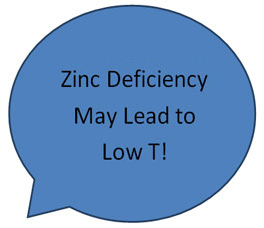17 Important Facts about Zinc and Testosterone

What you do not know about zinc may be hurting your testosterone levels!
Here are 17 important facts about zinc and testosterone that everyone needs to know:
- The body needs 24 micronutrients (essential minerals) for survival, and one of them is zinc
- Zinc cannot be stored in the body
- The human body cannot synthesize zinc
- Zinc must enter the body via food intake or supplements
- Zinc deficiency is worldwide, including in the US
- Zinc deficiency is linked to hypogonadism
- Zinc will boost testosterone levels in people who have a zinc deficiency
- Zinc helps regulate enzymes
- Zinc is an antioxidant
- Zinc is an immune booster
- High doses of zinc can inhibit the enzyme aromatase from converting testosterone levels into estrogen
- Zinc in high doses can repair intestinal mucosa
- You lose zinc when you sweat
- Zinc can help with prostate issues
- Green tea increases zinc absorption
- Do not take zinc with iron
- Oysters, crab, beef, legumes, nuts, oatmeal, and eggs are high in zinc
When we look at low levels of zinc and testosterone effects that result from this mineral deficiency, it becomes evident the impact that zinc can have on testosterone levels.
Zinc Deficiency and Low Testosterone
A person who has a zinc deficiency may find him or herself dealing with low testosterone levels. Zinc is crucial for immunity, cell division, and helping enzymes break down food. Since testosterone stimulates red blood cell production in bone marrow, as well as metabolic functions, you can see how zinc and testosterone are intertwined.
Two surprising facts about zinc and testosterone levels in healthy younger men came from these studies:
- Total testosterone, free testosterone, and three thyroid hormones (TT3, TT4, FT3) all decreased in young men who did not engage in regular exercise after bicycle exercise except when oral zinc sulfate supplementation was added for four weeks. [1]
- A study on ten male wrestlers showed that resting total and free testosterone levels, as well as the above-mentioned thyroid hormones, were higher before exhaustion exercise without zinc supplementation, but after receiving four weeks of supplemental zinc prevented the inhibition of these hormones. [2]
There are also documented benefits about zinc and free testosterone in older men:
- The use of supplemental zinc for six months in elderly men resulted in a serum testosterone increase from 8.3 +/- 6.3 to 16.0 +/- 4.4 nmol/L (p=0.02). [3]
Increase Zinc and Raise Testosterone
While zinc may work to increase testosterone levels in men dealing with a zinc deficiency, it will not help if the body is already getting enough zinc for its needs.
When we look at the benefits of supplemental zinc and testosterone replacement therapy, we have to take into consideration the symptoms a man (or woman) is facing. If the symptoms of Low T are severe and interfering with the overall quality of life in some way, the beneficial option may be to start testosterone therapy.
Giving the body the testosterone boost that it needs right away will help raise testosterone levels safely and effectively.
If there is a concern about low testosterone, but symptoms are not yet severe, then supplementing with zinc may be an answer, especially if the symptoms of zinc deficiency are present.
Zinc deficiency symptoms include:
- Thinning hair or hair loss
- Chronic disease
- Frequent illness
- Changes in food taste
- Hearing loss
- Diarrhea
- Allergies
- Acne or skin rashes
If you do not have most of these symptoms of low levels of zinc, and testosterone therapy might be beneficial, please contact HT Medical Center for a confidential consultation at no charge.

















